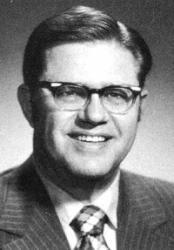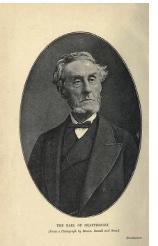Planning worship?
Check out our sister site, ZeteoSearch.org,
for 20+ additional resources related to your search.
- |
User Links
Person Results
John Richardson
1816 - 1879 Person Name: John Richardson, 1816-1879 Arranger of "ST. BERNARD" in At Worship
John Richardson
James R. Murray

1841 - 1905 Person Name: J. R. M. Composer of "[Thy word is like a garden, Lord]" in Little Sacred Songs L.P.M. (1905, April 12). Obituary. New Church Messenger, p.209.
Murray.--At Cincinnati, March 10, 1905, James Ramsey Murray. Funeral services in the Church of the New Jersualem, March 13th.
James R. Murray was widely known in the musical world as the author of many songs and song books, and in the New Church in Chicago and Cincinnati as an affectionate, intelligent, and loyal New Churchman.
He was born in Andover (Ballard Vale), Mass., March 17, 1841. In early life he developed musical talent, and composed many minor pieces for local and special occasions. Later at North Reading, Mass., he attended Dr. George F. Root's School of Music, and was associated with William Bradbury and Dr. Lowell Mason. He enlisted in the Fourteenth Regiment of infantry, commonly known as the Essex County Regiment, and afterwards was changed to the First Regiment, Massachusetts Heavy Artillery, which was engaged in most of the battles fought by the Second Army Corps up to the surrender of General Lee.
"Daisy Deane," the first and most popular of his early song successes, was composed in 1863 in Virginia while in camp, words by his cousin, Thomas F. Winthrop. This song is known all over the world, and the Salvation Army is using an arrangement of it for one of their war cry songs.
In 1868 Mr. Murray married Isabella Maria Taylor of Andover; and they removed to Chicago. Here three children were born to them, two passing early to their heavenly home, the youngest, Winthrop Root Murray, is still living. It was during these first years in Chicago that Mr. and Mrs. Murray became interested in the New Church, while he was engaged with Root and Cady as editor of the Long Visitor, afterwards merged with the Musical Visitor. After the great fire of 1871 Mr. and Mrs. Murray returned East, where he was engaged in teaching in Lawrence and Andover, and as organist at the Old South Church in Andover. In 1881 they removed to Cincinnati and Mr. Murray became the editor of the Musical Viistor [sic] and head of the publication department of the John Church Company. Among the most popular of his books are "Pure Diamonds," "Royal Gems," "The Prize" and "Murray's Sacred Songs." The following titles will recall some of his best loved sacred songs: "At Last," "Calm on the Listening Ear of Night," "I Shall Be Satisfied," "There Shall No Evil Befall Thee," "Thine, O Lord, Is the Greatness," "The Way Was Mine," "How Beautiful Upon the Mountains," "Angels from the Realms of Glory."
His last great labor in the publishing department of the John Church Company was the seeing through the press five volumes of Wagner's music dramas, with full score and original German text, and an English translation. The immense and careful labor involved in the preparation of these volumes, with a really smooth and excellent English translation, had perhaps, as it was done under pressure, something to do with Mr. Murray's breakdown. Although for some reason Mr. Murray's name does not appear on the title page of these volumes, his friends knew of the place the work held in his affections and ambition.
Mr. Murray was a member of the Church Council of the Cincinnati Society for the last four years and took a deep interest in the building of the New Church, and in the inauguration of services, with all the changes looking to the improvement of the musical part of the service. The vested choir, organized by Mr. and Mrs. Lawson, which Mr. Murray as councilman had urged from the beginning, in their entrance to the church each Sunday singing the processional hymn participated in the funeral service, with a congregation of brethren and friends, all moved by deep love and profound respect for the consistent life and faith of a worthy Churchman and beloved friend.
--DNAH Archives
===================================
For a discussion of Murray and the tune MUELLER, see: Stulken, M.K. (1981). Hymnal companion to the Lutheran Book of Worship. Philadelphia : Fortress Press, p.170.
===================================
Also available in the DNAH Archives:
1. An excerpt from Christie, George A. (1927). New Free Church. In Music in Andover. Papers read at "Fagot Party" of the Andover Natural History Society.
2. Unsourced essay about Murray written soon after his death, likely from Andover, Mass., perhaps authored by Charlotte Helen Abbott.
James R. Murray
Frederick G. Baker
1839 - 1919 Person Name: F. G. Baker Composer of "MY SAVIOUR" in The Sunday School Hymnary Frederick George Baker was born in Shorwell, Isle of Wight on May 19, 1839. Served at St. Saviour’s Church, Shanklin, for almost 30 years. He died in Shaklin, Isle of Wight on March 10, 1919.
NN
Frederick G. Baker
William Jensen Reynolds

1920 - 2009 Person Name: William J. Reynolds Arranger of "CLONMEL" in Christian Praise
Pseudonyms include:
Bigelow, James
Buie, Dean
Clark, John
Day, Francis
Dorff, Gregory
Dorsey, Jane
Drakestone, John
East, Richard
Eastis, Ellen
Frye, Dan
Gregory, Peter
Harrold, Stan
Hawk, John
Horn, Ellen
Ingham, Marie
Jordaan, Jacques
Keely, Grant
Kije, Cyd
Kringel, Cark
Kuliami, Tiki [?]
Lee, Wilbur
Long, Richard
Long, Robert
MacDougall, Thom
Madsen, Carl O.
Monroe, Lou
Munroe, June
Reed, Ruth
Rodgers, Lee
Rosemont, David
Ross, Don
Saul, J. Crawford
Sneed, Roger
Wheeler, Annette
Winston, Clyde
York, Henry
--Email from William Colson to Mary Louise VanDyke, 4 May 2005, DNAH Archives. Names taken from the program of Reynolds' retirement dinner. Colson notes, "The program has faded and the one designated with a question mark is not 100% certain."
William Jensen Reynolds
Robert Jackson

1840 - 1914 Composer of "[Thy word is like a garden, Lord]" in The School Hymnal After receiving his musical training at the Royal Academy of Music, Robert Jackson (b, Oldham, Lancashire, England, 1840; d. Oldham, 1914) worked briefly as organist at St. Mark's Church, Grosvenor Square, in London. But he spent most of his life as organist at St. Peter's Church in Oldham (1868-1914), where his father had previously been organist for forty-eight years. A composer of hymn tunes, Jackson was also the conductor of the Oldham Music Society and Werneth Vocal Society.
Bert Polman
Robert Jackson
Edwin Hodder

1837 - 1904 Author of "Your Word Is like a Garden, Lord" in Trinity Hymnal (Rev. ed.) Hodder, Edwin, published in 1863 The New Sunday School Hymn Book, and in 1868 a New and Enlarged edition of the same. To this collection he contributed 27 hymns, each of which is headed with his name. Of these nearly one half have passed into other hymnals for children, including Major; the Baptist Sunday School Hymn Book, 1880 ; the Sunday School Union Voice of Praise, 1886, and others. Born in 1838.
--John Julian, Dictionary of Hymnology, Appendix, Part II (1907)
=======================
Hodder, Edwin, p. 1571, i., was b. Dec. 13, 1837, at Staines, Middlesex, and went to New Zealand in 1856. After his return he joined the English Civil Service in 1861, retiring in 1897, and finally resided at Henfield, Sussex. He d. March 1, 1904. He was the author of many works, biographical, devotional and other, the earliest being Memories of New Zealand Life, 1862, and the latest The Life of a Century, 1900. His hymns appeared in his New Sunday School Hymn Book, 1863, and 2nd ed. 1863, including:—
1. Father, give us now Thy blessing. Close of School.
2. Lord, we bring our work to Thee. Christian Service.
3. The night was wild, and stormy winds. It is I.
4. The Saviour loves all children. Jesus the Children's Friend.
5. Thy Word is like a garden, Lord. Holy Scripture.
Of these Nos. 1, 3, 5, appeared in 1863, Nos. 2, 4 were added in 1868. [Rev. James Mearns, M.A.]
--John Julian, Dictionary of Hymnology, New Supplement (1907)
Edwin Hodder
Gottfried W. Fink

1783 - 1846 Composer of "SERAPH" in Trinity Hymnal (Rev. ed.) Rv Gottfried Wilhelm Fink PhD Germany 1783-1846. Born at Sulza, Thuringa, Germany, he was a German composer, music theorist, poet, and a protestant clergyman. From 1804-1808 he studied at the University of Leipzig, where he joined the Corps Lusatia, where he made his first attempts at composition and poetry. In 1811 he was appointed Vicar in Leipzig for some years, where he also founded an educational institution, leading it until 1829. Around 1800 he worked for the “Allgemeine musikalische Zeitschrift” (General musical mazazine). In 1827 he became the magazine's editor-in-chief for 15 years. From 1838 he was a lecturer at the University of Leipzig. In 1841 he became a Privatdozent of musicology at the university. That year he became a member of the Prussian Academy of Arts in Berlin, and a year later was appointed university Music Director. He was highly esteemed throughout his life as a music theorist and composer, receiving numberous honors and awards, both at home and abroad. The Faculty of Philosophy at Leipzig University awarded him an honorary doctorate. He wrote mostly Songs and ballads and collected songs as well. He authored important words on music theory and history, but was best known as editor of the “Musikalischer Hausschatz der Germans”, a collection of about 1000 songs and chants, as well as the “Deutsche Liedertafel” (German song board), a collection of polyphonic songs sung by men. He died at Leipzig, Saxony.
John Perry
Gottfried W. Fink
C. W. Poole
1828 - 1924 Person Name: Clement William Poole (1828-1924) Composer of "PETERSHAM" in The Hymnal
C. W. Poole


 My Starred Hymns
My Starred Hymns


